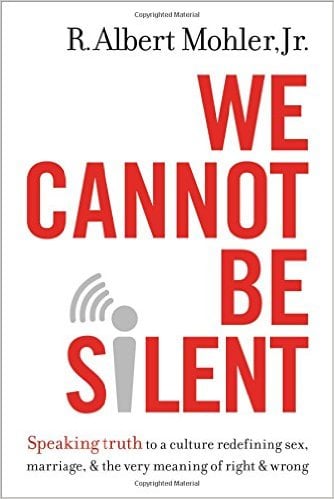⏱️ Estimated Reading Time: 4 min read
How did we get here?
This is the question that We Cannot Be Silent seeks to answer. In the wake of the massive tidal wave of recent events regarding redefinition of marriage, sex, and morality, this is a question many evangelicals don’t have an answer for. When the Supreme Court handed down their decision to affirm homosexual couples as legitimate married couples, it felt to many of us like the rug had been pulled from under us. How did we get here? And not only this question, but another is just as important: what will we do?
Albert Mohler is a voice that stands confidently and loudly in the evangelical, political, and academic world. He is a bona fide culture warrior and has always recognized the importance of speaking out for the sake of the gospel. His widely-known podcast The Briefing is a fine example of this, where Mohler daily lays out the cultural climate and shows how we should be responding to it with the gospel. This book is merely an extension of the kind of work Mohler so faithfully does each day.
Those familiar with Mohler and his work should not feel this book is just regurgitation of the “same old same old,” however. We Cannot Be Silent is a comprehensive manifesto outlining Western culture sexuality and how its transformation is impacting the church at large. More importantly, Mohler does the dirty work of backing up decades upon decades for us to analyze the full secularization of our culture’s views on certain moral issues, such as homosexuality, transgenderism, birth control, divorce, etc.
Those that are gay-affirming could likely think this book is Mohler’s attempt to judge and condemn such individuals, and his attempt to “Bible thump,” but this is definitely not the case. In fact, perhaps to the surprise of some conservative Christians, Mohler actually blames many of our culture’s sexual issues on not the unbelievers but the church, not homosexuals but heterosexuals:
Conservative Christians far too quickly accuse the proponents of same-sex marriage of being the enemies of marriage, believing that marriage was in great shape before same-sex couples started clamoring for the legal recognition of their unions. This is intellectual dishonesty, and the record must be set straight. The previous damage to marriage can be traced to the intellectual, sexual, legal, and therapeutic subversion of marriage by heterosexuals. (89)
Mohler spends a lot of time dealing with the “How did we get here?” question, devoting really the first six chapters to exploring this question deeply. In Chapter 7, Mohler outlines the Biblical foundations for his arguments for a traditional, conservative understanding of sexuality. Chapters 8 and 9 deal with the challenges the Church at large will face in light of the sexual revolution. Finally, Chapter 10 is a helpful selection of 30 common questions we hear from the revisionist’s point of view. In perhaps the most practical and helpful applicable chapter, Mohler treats each of these with clarity and conviction and helps us learn how to properly think and respond to these tough questions.
The best part of We Cannot Be Silent is that it reinforces the message of the title through and through. We have here an extremely useful manual to help us better process and engage with these touchy and often controversial subjects with confidence and ease. The truth is, we cannot be silent. We must not. There is no reason for us to be silent, especially with having a tool like this to aid us along the way.
Dear Christian brother and sister, if you are looking for some guidance through these weighty cultural issues and want a better grasp on how to have conversations surrounding the secularization of sexuality, here’s a great place to start. Whether or not we think these issues matter to our personal context, the truth is, especially as you read Mohler’s work, that these issues will inevitably become something we all face soon enough. “We Christians must keep our biblical and theological sanity,” Mohler remarks, “even when the voices around us demand we join the moral insanity” (138). We Cannot Be Silent helps us retain our sanity and hold fast to our convictions.
We cannot be silent, and we cannot join the moral revolution that stands in direct opposition to what we believe the Creator has designed, given, and intended for us. We cannot be silent, and we cannot fail to contend for marriage as the union of a man and a woman…We are called to be the people of the truth, even when the truth is not popular and even when the truth is denied by the culture around us…The church’s mission has not changed. Jesus Christ is the same, yesterday, today, and forever. (183)
Amen, Dr. Mohler.



